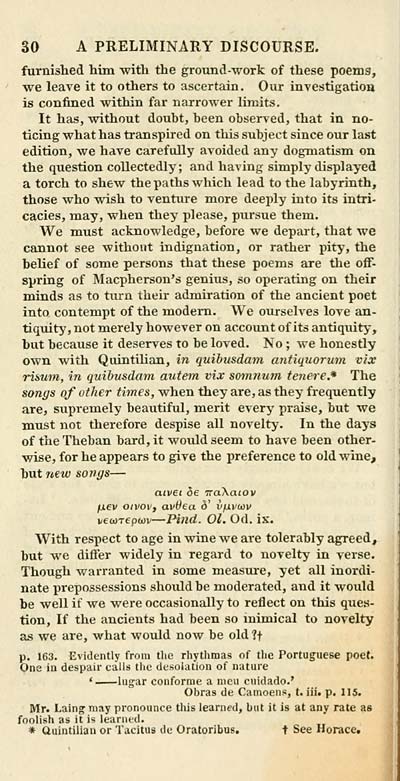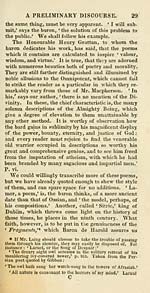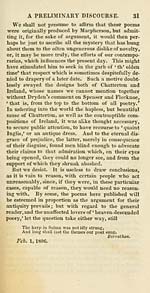Ossian Collection > Poems of Ossian
(38)
Download files
Complete book:
Individual page:
Thumbnail gallery: Grid view | List view

so A PRELIMINARY DISCOURSE,
furnished him with the ground-work of these poemg,
we leave it to others to ascertain. Our investigatioa
is confined within far narrower limits.
It has, without doubt, been observed, that in no-
ticing what has transpired on this subject since our last
edition, we have carefully avoided any dogmatism on
the question collectedly; and having simply displayed
a torch to shew the paths which lead to the labyrinth,
those who wish to venture more deeply into its intri-
cacies, may, when they please, pursue them.
We must acknowledge, before we depart, that we
cannot see without indignation, or rather pity, the
belief of some persons that these poems are the off-
spring of Macpherson's genius, so operating on their
minds as to turn their admiration of the ancient poet
into contempt of the modern. We ourselves love an-
tiquity, not merely however on account of its antiquity,
but because it deserves to be loved. No ; we honestly
own with Quintilian, in quibusdam antiquorum v'tx
risum, in quibusdam autem vix somnum tenere.* The
songs of other times, when they are, as they frequently
are, supremely beautiful, merit every praise, but we
must not therefore despise all novelty. In the days
of theTheban bard, it would seem to have been other-
wise, for he appears to give the preference to old wine,
but n€w sovgs —
aivei be ^aXatov
juev oivov, avtiea 6' iifjLvuiv
vemrepwv — Pilld. 01. Od. ix.
With respect to age in wine we are tolerably agreed,
but we difler widely in regard to novelty in verse.
Though warranted in some measure, yet all inordi-
nate prepossessions should be moderated, and it would
be well if we were occasionally to reflect on this ques-
tion. If the ancients had been so inimical to novelty
as we are, what would now be old ?t
p. 163. Evidently from tlie rhythmaa of the Portuguese poet.
One in despair calls tlic desolation of nature
' lugar conforme a nicu cuidado.'
Obras de Camoens, t. iii. p. IIS.
Mr. Laing may pronounce tliis learned, but it is at any rate as
foolish as it is learned.
* Ouintilian or Tacitus de Oratoribus, t See Horace.
furnished him with the ground-work of these poemg,
we leave it to others to ascertain. Our investigatioa
is confined within far narrower limits.
It has, without doubt, been observed, that in no-
ticing what has transpired on this subject since our last
edition, we have carefully avoided any dogmatism on
the question collectedly; and having simply displayed
a torch to shew the paths which lead to the labyrinth,
those who wish to venture more deeply into its intri-
cacies, may, when they please, pursue them.
We must acknowledge, before we depart, that we
cannot see without indignation, or rather pity, the
belief of some persons that these poems are the off-
spring of Macpherson's genius, so operating on their
minds as to turn their admiration of the ancient poet
into contempt of the modern. We ourselves love an-
tiquity, not merely however on account of its antiquity,
but because it deserves to be loved. No ; we honestly
own with Quintilian, in quibusdam antiquorum v'tx
risum, in quibusdam autem vix somnum tenere.* The
songs of other times, when they are, as they frequently
are, supremely beautiful, merit every praise, but we
must not therefore despise all novelty. In the days
of theTheban bard, it would seem to have been other-
wise, for he appears to give the preference to old wine,
but n€w sovgs —
aivei be ^aXatov
juev oivov, avtiea 6' iifjLvuiv
vemrepwv — Pilld. 01. Od. ix.
With respect to age in wine we are tolerably agreed,
but we difler widely in regard to novelty in verse.
Though warranted in some measure, yet all inordi-
nate prepossessions should be moderated, and it would
be well if we were occasionally to reflect on this ques-
tion. If the ancients had been so inimical to novelty
as we are, what would now be old ?t
p. 163. Evidently from tlie rhythmaa of the Portuguese poet.
One in despair calls tlic desolation of nature
' lugar conforme a nicu cuidado.'
Obras de Camoens, t. iii. p. IIS.
Mr. Laing may pronounce tliis learned, but it is at any rate as
foolish as it is learned.
* Ouintilian or Tacitus de Oratoribus, t See Horace.
Set display mode to: Large image | Transcription
Images and transcriptions on this page, including medium image downloads, may be used under the Creative Commons Attribution 4.0 International Licence unless otherwise stated. ![]()
| Early Gaelic Book Collections > Ossian Collection > Poems of Ossian > (38) |
|---|
| Permanent URL | https://digital.nls.uk/81238325 |
|---|
| Description | Selected books from the Ossian Collection of 327 volumes, originally assembled by J. Norman Methven of Perth. Different editions and translations of James MacPherson's epic poem 'Ossian', some with a map of the 'Kingdom of Connor'. Also secondary material relating to Ossianic poetry and the Ossian controversy. |
|---|
| Description | Selected items from five 'Special and Named Printed Collections'. Includes books in Gaelic and other Celtic languages, works about the Gaels, their languages, literature, culture and history. |
|---|

